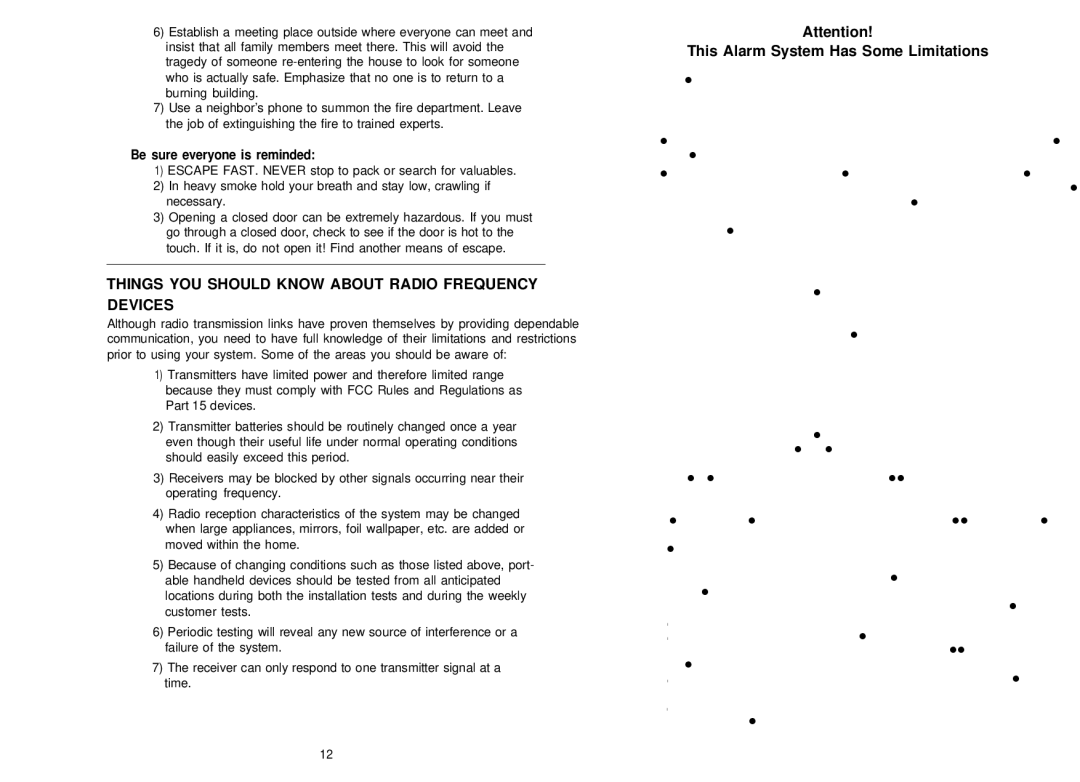6)Establish a meeting place outside where everyone can meet and insist that all family members meet there. This will avoid the tragedy of someone re-entering the house to look for someone who is actually safe. Emphasize that no one is to return to a burning building.
7)Use a neighbor’s phone to summon the fire department. Leave the job of extinguishing the fire to trained experts.
Be sure everyone is reminded:
1)ESCAPE FAST. NEVER stop to pack or search for valuables.
2) In heavy smoke hold your breath and stay low, crawling if necessary.
3) Opening a closed door can be extremely hazardous. If you must go through a closed door, check to see if the door is hot to the touch. If it is, do not open it! Find another means of escape.
THINGS YOU SHOULD KNOW ABOUT RADIO FREQUENCY DEVICES
Although radio transmission links have proven themselves by providing dependable communication, you need to have full knowledge of their limitations and restrictions prior to using your system. Some of the areas you should be aware of:
1)Transmitters have limited power and therefore limited range because they must comply with FCC Rules and Regulations as Part 15 devices.
2)Transmitter batteries should be routinely changed once a year even though their useful life under normal operating conditions should easily exceed this period.
3)Receivers may be blocked by other signals occurring near their operating frequency.
4)Radio reception characteristics of the system may be changed when large appliances, mirrors, foil wallpaper, etc. are added or moved within the home.
5)Because of changing conditions such as those listed above, port- able handheld devices should be tested from all anticipated locations during both the installation tests and during the weekly customer tests.
6)Periodic testing will reveal any new source of interference or a failure of the system.
7)The receiver can only respond to one transmitter signal at a time.
Attention!
This Alarm System Has Some Limitations
Capricorn Electronics, Inc. manufactures some of the most advanced security systems in the industry. However, even the most advanced security system cannot be guaranteed to warn the end user in every case of fire, unauthorized entry, or other emergencies.
An alarm system is not a substitute for vigilance and preparedness. Users should have plans of action in the event of fire, intrusion, or any other emergency.
An alarm system can only operate properly if recommended maintenance procedures are observed. The most frequent cause of alarm malfunctions is inattention to maintenance. The system should be tested once each week to be certain compo- nents are working. In the case of RF components, special attention should be paid to the batteries. Replace weak batteries or those over one year old with fresh batteries according to the instructions provided with each component.
Here are some of the many reasons why a security system can fail to function as anticipated:
1)Some professional thieves know techniques for disabling alarm systems, or they may have had an opportunity to “case” the property to find unprotected openings through which they may enter undetected.
2)It may not be possible for a user to reach and operate a panic button fast enough to activate the system in an emergency.
3)Power and maintenance requirements may not have been observed. Alarm sensors, such as passive infrared detectors, RF (radio frequency) transmitters, smoke detectors and other devices must have proper power to operate correctly. Battery operated units must be equipped with fresh batteries of the proper voltage (see instructions for checking and changing batteries). AC-powered units will not operate if their power supplies are cut off. Backup batteries in AC-operated units should also be checked regularly.
4)Radio frequency (RF) transmitting devices may be compromised. RF devices depend solely on proper installation for predictable operation. If the end user
changes the RF characteristics of the structure (e.g., moving large appliances, use of amateur radio broadcasting equipment by anyone in the vicinity, installing machines with large electric motors, installing foil-backed wallpaper, or many other possibilities), certain RF devices may cease operating properly. The installing dealer should be consulted if any changes are made within a building where RF devices are used.
5)Smoke detectors may not operate for many reasons. The Federal Emergency Management Agency has published statistics that indicate smoke detectors fail to warn building occupants in as many as 35% of all fires. Smoke detectors can fail to operate for a variety of reasons, including the following:
•Improper positioning.
•Smoke is in an enclosed area where it cannot reach the detector (such as in chimneys, in walls, on roofs, or on the other side of closed doors).
•Fire is in another area of a building, e.g., a first-floor detector may not sense a basement fire.
•A smoke detector cannot make up for failure to observe common sense rules of fire safety. A detector may not warn about hazards
